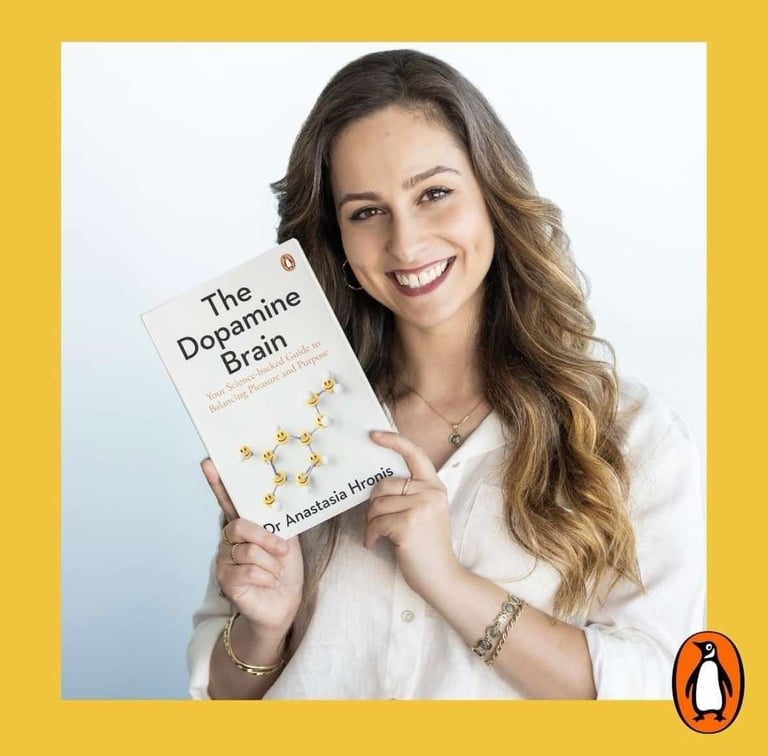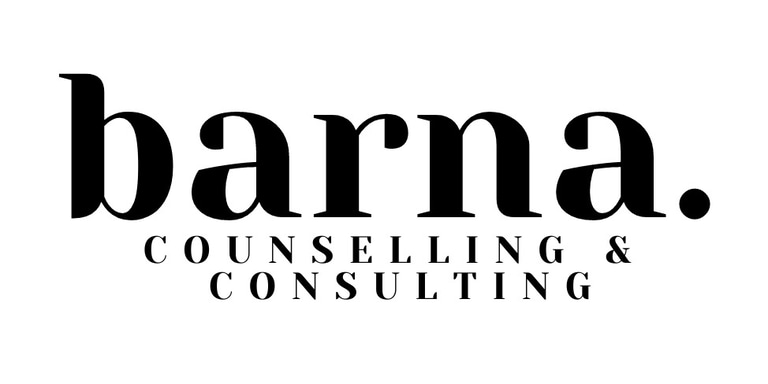The Dopamine Brain
A brief review of Dr. Anastasia Hronis's new book
BOOKSNEUROSCIENCESTRESSBOOK REVIEWSADDICTION
Emil Barna
6/15/20256 min read


Three years back, I interviewed Dr. Anastasia Hronis on my podcast where we dived into themes of music and addiction and motivation and helping kids with their mental health. The other day, I finally got around to reading her recently released (and debut) book, The Dopamine Brain. It's a short one—185 pages in all—so I read it in a day and ... well, let's see what I found.
We live in a dopamine-saturated world, says Hronis. It's fast and 'sticky' (to use a term from the tech world) and it's addictive. Plus, we're often so consumed with what's brushing up against our noses that we don't even realise we’re in it. That’s what makes this book so appealing. I must say, I probably read it at a bad time for where my mental state was—I'd just finished Dr. Lisa Feldman Barrett's magnificent How Emotions Are Made, so part of me was expecting a science-heavy, explorative, and neuroscientifically rigorous work. That's not what it is ... and that's a GOOD thing. It's a book that' short, punchy, to the point, and has just enough science to back up the main points without boring the reader to death.
And it's supremely practical!
This book holds up a mirror to the reader—not just to one's habits, but to one's assumptions and values and actions (whether they align or not). And it gives you an idea about why you keep doing things that don’t actually serve you.
Hronis doesn’t write like a theorist. She's a clinician AND a researcher who’s seen what she writes about up close: People chasing hits—whether drugs and alcohol or sex or gaming or social media or gambling or sugar—and losing the thread of their lives.
“Actions based on values and those based on short-term dopamine hits are often at odds. That makes values important to consider and discuss, as the craving for dopamine-driven behaviours can divert us from engaging in activities that are meaningful and aligned with our values.”
This sentence encapsulates the whole book. But she goes further. From ancient brain science to modern neuroscience, she explores, generally and engagingly, the crossovers between the brain and behaviour: “In 1908, the German psychologist, Hermann Ebbinghaus, wrote that ‘psychology has a long past, but only a short history.’” “In ancient Greece, the work of Alcmaeon of Croton, a medical writer and scientist who lived around 500 BCE, further shaped our understanding of neuroscience. Alcmaeon suggested that the brain, not the heart, ruled the body and was the source of a person's intelligence.”
From Alcmaeon to Instagram, Hronis explains the importance of brain and behaviour.
On social media: “When it comes to social media, we start off at a disadvantage. This is because social media apps have been designed to be reinforcing, or as they say in the tech world, 'sticky'.” “Social media has been explicitly designed to be unpredictable. When you pull down and refresh your newsfeed, or re-open an app, you'll see something new. You don't know what those new posts will be. They might be very interesting. They might be mildly interesting. They might be as boring as they get. But we keep checking and refreshing because we know sometimes we see something really good.”
The result? Dopamine trains you towards addiction—without your consent. And it’s not just phones, but food and games and gambling and booze: “When someone loses money, they feel compelled to keep playing in the hope of recouping their loss. Unfortunately, this usually results in more losses. The experience shifts from that of ‘liking’ to ‘wanting.’” “People who become addicted to video games show changes to their ‘grey matter’ volume in the dopaminergic system. This is thought to contribute to impaired self-control, which further perpetuates the problem.” “Brain imaging studies show rapid activation of the brain's reward pathways still occurs when drug-related cues are displayed to people who haven't used drugs for a month. Even though they've stopped taking the drug, the activation still happens, evidenced by an increase in blood flow to the reward pathways. This occurs even when they're shown cues for a tiny thirty-three milliseconds—cues so brief that they don't even reach our conscious awareness. And when this happened, they reported cravings, with the strength of the craving directly related to the amount of dopamine released.”
Thirty-three milliseconds! This caught me off guard. It's a whole brain affair ... and it's happening underneath our noses (or above, if you want to get anatomical).
On alcohol: “Alcohol is a toxic, dependence-producing substance. [...] “It's in the highest risk group for developing cancer, and in the same category as asbestos, radiation and tobacco. It's known to cause at least seven types of cancer, including breast cancer and bowel cancer. Ethanol, which is the ingredient that affects our health and makes us feel drunk, is the chief culprit. Any beverage which contains ethanol, regardless of its cost or quality, increases our risk of developing cancer. It doesn't matter whether it's a simple goon bag or the most extravagant French champagne.”
You can’t read this and walk away with a shrug. You begin to notice a tension between what you want now and what you really value. Take what she says about the latter:
“To ensure that you have identified values and not goals, remember that values don't have an end point. For example, health is a value, but going to the gym five times a week is a goal.”
“Sometimes engaging with one value means we sacrifice another. This is why making the transition from identifying values to actual behavioural change is so challenging. It's a constant balancing act.”
“If I'm sitting at my desk each day thinking about when I can pop downstairs and buy one, then the doughnuts have power over me. I need to assert control over if and when I choose to have a doughnut, and not feel compelled to buy one or preoccupied thinking about buying one.”
A fun anecdote that most of us can identify with. And a good rule to determine whether a behaviour has become problematic: Is it on my mind more often tha it used to be? Am I preoccupied with thinking about it? Does it feel like IT is in control?
Then, she tackles burnout—I mean, 'hustle culture':
“Hustle culture has little regard for rest, self-care or work-life balance. Instead, the focus is squarely on productivity, ambition and success. Society tells us this approach is valuable and important and those who adopt this set of values will be rewarded for their achievements. However, it can also go terribly wrong. Hustle culture is a recipe for burnout.”
So what to do? Here, Hronis offer clear strategies. For cravings (and I like the first one, being a reader): “Look at that page and count all the letter e’s. Every single one of them. Don't read the text, just count the e's. Not a fan of e's? Then how about all the p's, or any letter of your choosing!” Or “Go through the alphabet and for each letter come up with the name of an animal. A is for anteater, B is for bulldog, C is for caterpillar... and so on. If you don't like animals or have already done that, then you can try the same letter exercise with girls names, boys' names, countries or cities around the world, colours, instruments, vegetables, sports, celestial objects... the sky is the limit!”
To distract, this is her take:
“Ever chewed on a raw piece of ginger? It's not pleasant but it sure is intense! For some people, strong peppermint flavours, or scents do the trick. As do smelling eucalyptus oil, sucking on sour lollies like Warheads, eating popping candy or even a lemon.” “Strong flavours such as wasabi or hot sauce” (if you carry them around in their little take-away sachets) can also snap you back into the present.
And, a favourite of mine (though, with a four-week-old baby in my arms from morning to night, this is harder to do these days), cold water exposure:
“When our body comes into contact with cold water, several physiological changes occur. Our heart rate slows which helps conserve oxygen and redirect blood flow, the blood vessels in our limbs constrict, and we slow down our breathing, or hold our breath if we're underwater. If you can't face a cold shower, fill a bowl or basin with cold water and submerge your face into it, with ice cubes for added effect!”
If you’re unsure how something’s affecting you, treat "taking a break [from the behaviour of concern] like an experiment is a good approach if you're not sure of the exact effect something is having on you.”
In all, a good read. If you want a rigorous exploration into dopamine, probably not the one for you. If you want an easy-to-read guide that's SUPER practical, check it out.
I'll end with the most important question of all: Anastasia, did you end up climbing the ropes since publishing the book?
Location
16 Playwright Street,
Clyde North, VIC 3978
